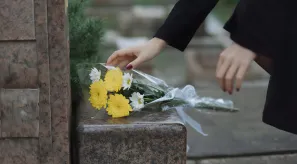Many people in Spain believe that a funeral and a burial are the same thing and use the two terms interchangeably. However, this is not the case and it is important to know the difference between a funeral and burial in order to be able to choose the option that best suits your needs. At Stelae, we will show you how to distinguish between them.
Are funerals and burials the same thing?
As we have said, they are two different concepts. To help understand, here are the definitions of both terms:
- A burial is when the body of a deceased person is buried. The most traditional way is in a coffin.
- A funeral is the ceremony performed to remember and honour a deceased loved one. It can occur as a service after the death or even on the anniversary of a loved one's death.
Main differences between a funeral and a burial
The confusion between these concepts is influenced by their meaning in English, as ‘funeral’ is a word used to describe a ‘funeral’ or a ‘burial’ so in Spanish it does not work in the same way.
In the Spanish language, a funeral is a series of solemn ceremonies held in honour of a deceased person, either a few days after the burial or on each anniversary of the death.
By contrast, the burial refers to the act of burying a deceased person together with the services related to the burial itself.
Do funerals and burials always go together?
Due to the difference between funerals and burials that we have just mentioned, the two do not always have to go hand in hand. There can be a funeral without a burial or a burial without a funeral... or even neither.
When a burial is opted for, families have the option of arranging, among other things, a funeral to say goodbye to their loved one.
As we know, however, there is a choice between cremation or burial, which means that, if the former is chosen, it is also possible to add the funeral as part of the farewell services.
Nevertheless, regardless of whether burial or cremation is chosen, families also have the option of saying goodbye to their loved one in a simpler way, without a funeral.
In addition, another way that burials and funerals can be separate is to hold a funeral service on the anniversary of the death of our loved one. In this case, of course, there will be no burial, but there will be an act of remembrance, which can vary considerably depending on the preferences of the relatives and influenced by cultural and religious issues, etc.
The importance of understanding the difference between funerals and funerals
Being aware of the difference between a funeral and a burial allows families to make the most appropriate decision about the funeral services they want in order to say goodbye to their loved one.
Choosing the right service for your needs
When choosing between a burial or funeral, or deciding to include both or even neither service when a loved one dies, families need to consider a number of factors before making their decision.
Cultural and religious issues play an important role in this respect, although family preferences and the wishes expressed by your loved one during their lifetime should always be taken into account when deciding how to say farewell.
Another key factor is the economic aspect. It is therefore important to assess the budget available, as well as the different finance options and if there is any funeral or similar insurance available.
Taking all this into account will help you to make a better decision.
Interesting cases of funerals and burials and their cultural traditions
At Stelae, we have previously discussed interesting cultural traditions, such as the Buddhist funeral, but we can also look at other cases to help us better understand the difference between a funeral and a burial.
Funerals without burials: cremations and other rituals
Is it possible to have a funeral without a burial? Of course! We have already examined two cases: one, if the cremation option is chosen; and two, if the funeral is held on the anniversary of the death of your loved one.
There are other interesting cases, such as the ‘seizenso’ living funeral. This is a trend in Japan and other Asian countries that consists of 'attending' your own funeral, i.e. celebrating a farewell with family, friends and relatives while you are still alive. Needless to say, it is a funeral without a burial.



